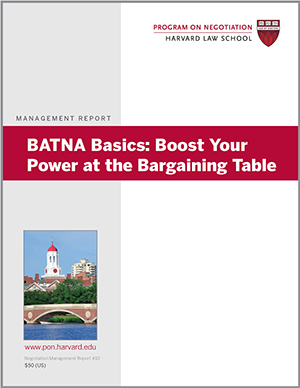
Chances are, you’ve practiced negotiation in business at one point or another. A Negotiation Briefings reader asked if it was possible to have a negotiation without a best alternative to a negotiated agreement, or BATNA. PON faculty members and negotiation researcher David Lax, Managing Partner at Lax Sebenius and Program on Negotiation faculty member, responds in this January 2008 article of “Dear Negotiation Coach,” first published in the monthly newsletter, Negotiation Briefings.
How to Negotiate with Sole Suppliers
Question: I am looking for tips on negotiating with sole suppliers who know I don’t have any real outside alternative and who take advantage of this. Without the power of a realistic BATNA, can you really negotiate?
Answer: You’ve outlined the quintessential hard-bargaining situation, in which your poor BATNA (best alternative to a negotiated agreement) puts you in a position of weakness.
The likelihood that at-the-negotiation-table tactics will succeed with an uncooperative negotiator is small. In such cases, you stand a better chance of gaining leverage from deal set-up and deal-design moves, as James Sebenius and I describe in our book 3-D Negotiation (Harvard Business School Press, 2006).
I’ll suggest some moves in each dimension.
Tips for Negotiation in Business #1: Setup moves.
Begin by setting the table favorably: involving the right parties, dealing with the right group of issues and interests, and facing the right outside alternatives. Such setup moves increase the odds that the other party will view your desired agreement as more attractive than their alternatives.
Tips for Negotiation in Business #2: Focus on Interests – Identify the parties within the supplier’s firm who might be affected by an agreement, and their interests.
- How is the sales team rewarded and promoted?
- Who would approve the deal on the other side?
- How are those individuals rewarded?
- Can you create a coalition on the other side that would support an agreement you’d like?
Tips for Negotiation in Business #3: Next, evaluate the supplier’s alternatives.
- How would the other party be affected if it didn’t get your business?
- Could it easily replace your volume?
You may be able to worsen the other side’s BATNA if you currently do business in another area of the supplier’s company and could move that business elsewhere.
Tips for Negotiation in Business #4: Finally, recognize that this is one round in a longer game.
- How much less would you pay the supplier if it had competition?
- What is the present value of these payments?
- How much would it cost to bring in another supplier or reengineer for a substitute product?
If the benefits of having a better alternative exceed the cost of getting it, invest now to create competition for the next negotiation.
Tips for Negotiation in Business #5: Dealmaking Strategies and Deal-Design
Next, look for ways to engineer more value for everyone involved.
Before engaging in the bargaining process, ask yourself questions such as these to develop your negotiation strategies:
- Could the supplier benefit from longer contractual commitments to secure better financing or volume guarantees?
- How about better terms and conditions to the negotiated agreement? Such benefits may not be shared by the supplier’s sales team.
If you help the supplier cut manufacturing costs, you may hurt a sales team that receives revenue-based bonuses. Thus, you might target parties who have the supplier’s broadest interests at heart. Suggest new areas in which you could do business in exchange for a lower price.
Negotiation Strategies and Bargaining Tactics
Moves you can make at the table include probing and listening actively to understand the supplier’s broader interests. Who stands to gain the most if you are satisfied?
Senior executives may realize that they shouldn’t set prices so high that you would be motivated to create competition.
Unless you can expand an agreement to include key supplier executives who realize they should not drive you to seek alternatives, your primary goal should be to ensure that you do not face this situation the next time you negotiate.
How has a BATNA helped you with a negotiation in business?
Related BATNA Article: Dealmaking – Are You Overly Committed to the Deal?
Adapted from “Dear Negotiation Coach: Negotiating with Sole Suppliers,” first published in the January 2008 issue of Negotiation.
Originally published in 2014.





